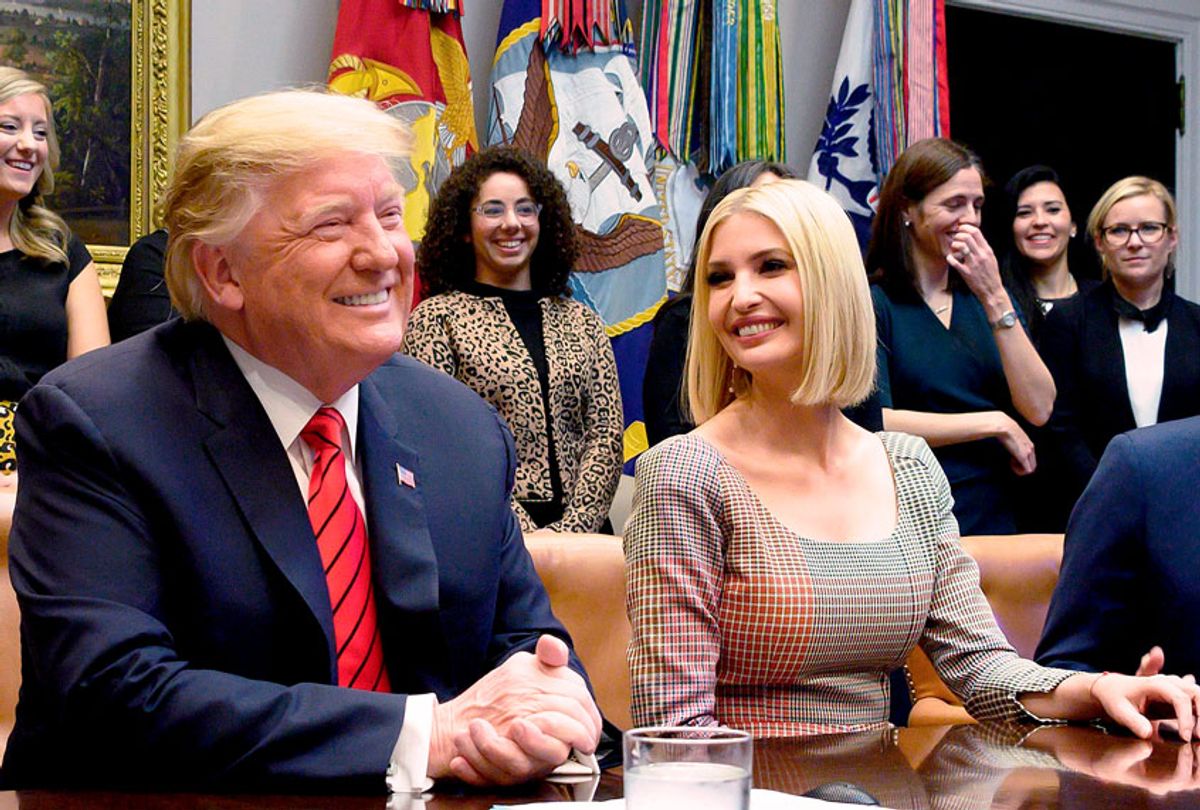Donald Trump repeatedly suggested during the 2016 campaign that his daughter, Ivanka Trump, should be his running mate, according to a new book by former deputy campaign manager Rick Gates.
"I think it should be Ivanka. What about Ivanka as my VP?" Trump reportedly asked a group of senior advisers in June 2016. "She's bright, she's smart, she's beautiful, and the people would love her!"
The idea was not a joke, according to Gates. Trump pressed his advisers repeatedly over the weeks leading up to the Republican convention that summer, insisting that Ivanka, at the time a 34-year-old real estate and fashion executive with no political or policymaking experience, would be a hit, while resisting other options, including then-Indiana Gov. Mike Pence. The campaign eventually polled voters — twice — on the prospect of Trump sharing the GOP ticket with his daughter, Gates says.
Ivanka Trump was the one who put a stop to it, telling her father she didn't think it was a good idea. Gates says that Trump ultimately went with Pence after he impressed Trump with a "vicious and extended monologue" about the Clinton family at a breakfast that summer.
Gates told the Washington Post in an interview that, while he wasn't sure Trump would have gone with Ivanka in the end, he chose to include the anecdote in his forthcoming book — titled "Wicked Game: An Insider's Story on How Trump Won, Mueller Failed, and America Lost," first reported by Bloomberg — as an example of Trump's outsider appeal.
Where some might see the idea as a "distasteful symbol of Trump's nepotism," the Post writes, Gates pointed to it as a sign of Trump's commitment to family, and his loyalty to "the values and assets" he cared most about," Gates told the paper.
On Sunday the New York Times reported that Trump's tax returns reveal that he wrote off "consulting fees" paid to Ivanka Trump for projects she co-managed as part of her job at the Trump Organization. The Times suggested that this raises questions about a possible scheme to compensate his adult children involved with his business, while avoiding the taxes involved in paying them directly.
Gates worked as former campaign manager Paul Manafort's right-hand man on the 2016 campaign, staying on after Manafort departed and eventually helping organize the inauguration. In October 2017, special counsel Robert Mueller's office indicted him on charges of conspiracy against the United States and lying to investigators in relation to his lobbying work with Manafort in Ukraine before joining the Trump campaign.
After pleading guilty in 2018, Gates sat with federal prosecutors for hundreds of hours of interviews and delivered pivotal courtroom testimony against both Manafort and former campaign aide Roger Stone. His testimony that Stone had given Trump a heads-up about WikiLeaks email dumps contradicted written responses that Trump provided under oath to Mueller in lieu of an in-person interview.
Gates was sentenced to 45 days in prison, which he was allowed to serve in weekend installments. His sentence was suspended in April amid the coronavirus pandemic.
Gates' campaign memoir is not an insider tell-all. It is a defense of Trump's campaign, a rebuke of the Russia investigation and a justification for re-electing "the most decisive president we've had probably since Eisenhower," as he told the Post.
Gates echoes Trump's allegations that the Mueller probe was unfair and unfounded, and that he and other campaign aides were targeted by biased prosecutors who wanted them to flip on Trump, when there was no criminal conduct to reveal. Two of the men Gates testified against were sentenced to prison. Trump eventually commuted Stone's sentence on obstruction charges, but has not taken similar steps toward Manafort, Gates' longtime business partner.
Asked whether he would take a presidential pardon, Gates told the Post, "Absolutely."
"I mean, who wouldn't?" he said, adding that he had not inquired.
"We have not made any overture. ... But if I were looking at this objectively, I would say that this started with political intention and that people were caught up in the inquiry in ways that they wouldn't have been if the inquiry had been done more properly," he told the Post.
"One of the things I think people lost focus on, again, on both sides is that we're all human beings. It got so politically toxic, it's almost as if both sides were not looking at the others involved as human beings, but instead just as political pawns that they could leverage," Gates said.



Shares